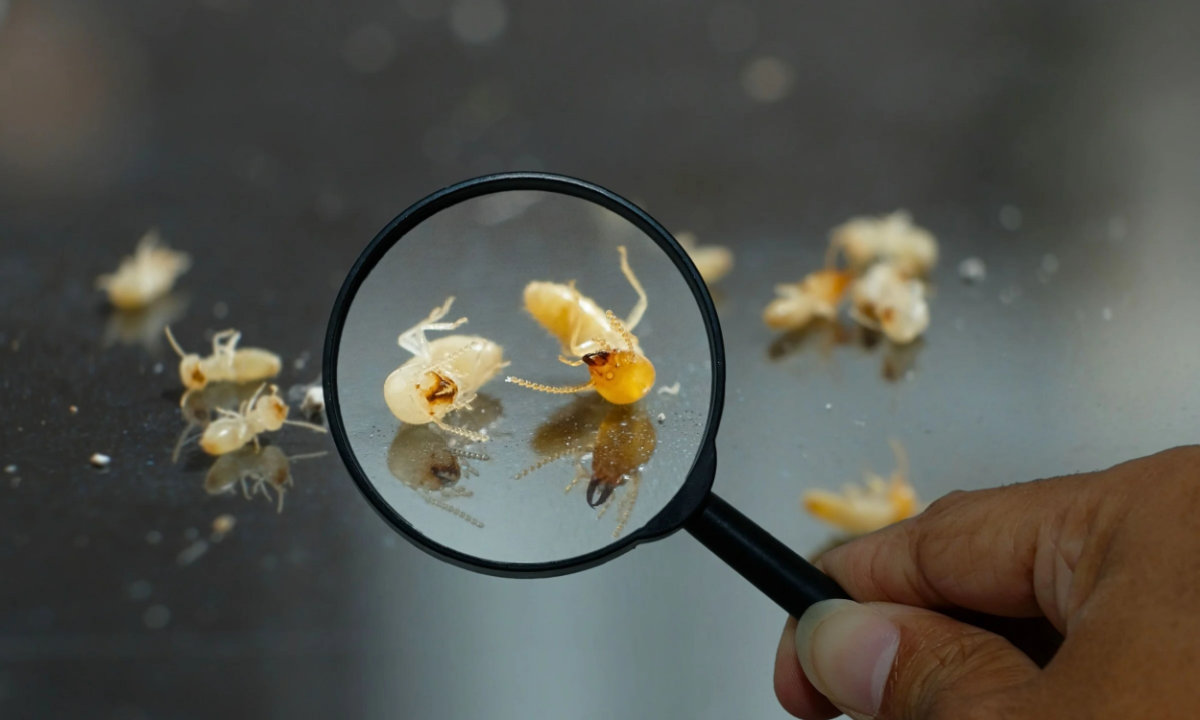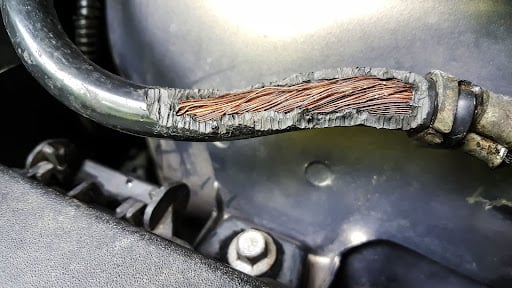Termites are responsible for over $30 billion of damage to homes and crops annually in the US. For the average homeowner, repairing the damages caused by a termite infestation could cost thousands of dollars.
While paying for an exterminator may be the last expense you had in mind, a termite inspection in New Jersey could end up saving you significant money.
Before booking a treatment, however, it’s important to understand the average cost of termite treatments in your area and any factors influencing their price.
This article will cover everything you need to know about termite treatment, including its average cost, how companies factor their final prices and all treatment options.
How Much Does Termite Treatment Cost?
There’s no set number for the price of a termite treatment; however, the average national cost ranges between $300 to $1,000 dollars.
Several factors contribute to the difference in price, such as the extent of the infestation, the type of termites, the type of treatment required, and the square footage and construction type of the home.
While termite treatment is not the least costly service offered, your home is often covered against reinfestation for a year or more afterward.
Additionally, Anchor Pest Control prides itself on no hidden fees or costly inspections. In fact, free, personalized quotes are always available online, and most inspections are completely free, giving homeowners the peace of mind of a clear assessment of the extent of their termite infestation.
Types of Termite Treatment and Cost
Termite treatments can vary significantly from home to home, with several factors necessitating different attack plans. Anchor Pest offers several types of treatments depending on the homeowner’s particular infestation, as listed below.
Liquid Treatments
These treatments include applying Termiticide, a chemical insecticide, to the foundations of affected homes. These treatments average ~ $3 to $10 per linear foot.
Bait Treatments
Bait boxes filled with insecticide-laced bait are set around the affected area. Termites, like ants, then bring the poisonous bait back to the colony, where it’s ingested by other termites to kill off the colony. Bait treatments are slightly more expensive than liquid and often require multiple visits. On average, bait treatments range between $8 and $12 per linear foot per visit.
Chemical Fumigation/Tenting
In some instances, bait treatments may not be effective depending on the type of termites in NJ you’re dealing with or the colony’s size. In this case, insecticide fumigants applied under a tent will eliminate all termites inside a home. Tenting often drives the price up significantly, and prices are compiled per square foot of space rather than per linear foot of the foundation–averaging approximately $1 to $3 per sq/ft.
Heat Tenting
Heat is another effective way of treating large infestations. With these treatments, the entire home is tented and heated until the interior of wood products reaches a temperature of 120 degrees Fahrenheit, for a duration of ~30 minutes. Pricing of heat tenting is around the same price as chemical tenting, approximately $1 to $3 per sq/ft.
Micro Treatment
Micro treatments are generally used when termites are only confined to a small, singular area. Pest experts will devise the best possible course of action and only treat the required space for an average price of $6 to $8 per sq/ft.
Barrier Treatments
On new builds and areas that are prone to infestations, barrier methods are often used to create a physical barrier between termites and your home. Treatment methods vary, but some include using sand or treated wood. Barrier methods tend to be more expensive, averaging $10 to $16 per linear foot; however, routine treatments are generally unnecessary.
Signs of Termites and Termite Damage
There are several warning indicators for termite infestations. However, without knowing where to look, these pesky little invaders may go months or even years unnoticed. With significant damage being dealt with in as little as 2 years, it’s essential to know the tell-tale warning signs of an infestation. The most common symptoms of termite damage may include:
- Mud tubes stretching your home’s foundation
- Excessively noisy or loose floorboards
- Small pin-holes in drywall
- Maze-like markings in wooden boards or furniture
- Hollow-sounding wooden structures
- Droopy drywall/loosening paint
- Stuck doors and windows
If one or more symptoms are present in your home, it’s best to have the property inspected for an active infestation.
Factors That Impact Termite Treatment Cost
Every home is different, and every infestation brings new challenges and treatment methods to overcome them. As a result, no two estimates will be the same, and a 100-percent accurate cost can’t be assumed without a proper inspection.
During an inspection, the following aspects of the infestation will be considered, allowing experts to arrive at the proper treatment cost for your home.
Type of Termites Present
Three primary types of termites are present in the New Jersey area, including Subterranean, Drywood, and Dampwood. Each has its own traits, difficulties during treatment, and associated costs.
Generally, Dampwood termites don’t infest homes due to the lack of moisture content in structures; instead, they prefer to inhabit dead trees and other high-moisture wood. Dampwood infestations are traditionally the least expensive to treat.
Subterranean and Drywood termites are the two species most commonly infesting homes, with Drywood termites typically residing in small colonies and causing damage to hardwood floors and wooden frameworks.
Drywood termites typically cause damage at a slow rate, due to the small colony size compared to Subterranean species. On the other hand, subterranean termites often inhabit large underground colonies with mud tubes connecting the colony to food sources. Due to the sheer size of Subterranean colonies, this type of termite infestation is often viewed as the most damaging, consuming up to 13 oz of wood in a single day.
When it comes to price, Drywood and Subterranean infestations can both be relatively high, though Drywood species are often the most expensive.
Level of Infestation
This one is relatively self-explanatory, but prices of treatment will generally increase as the level of infestation worsens. Small infestations can typically be handled in a single treatment ranging from $250 to $1,200; however, large infestations can increase the price of treatment upwards of $6,500.
Area of Infestation
Depending on the location and ease of accessibility, treatment prices can increase or decrease accordingly. If only a small, easily accessible area, such as a separate garage or shed, is infested, treatment can be as little as $150 to $250. On the other end of the spectrum, large or difficult-to-access areas, such as wood floors or attics, can cost top dollar, ranging anywhere from $300 to $900 for a single area.
Other
Several other factors listed previously can contribute to termite treatment prices, such as the type of treatment required, the frequency of treatments, and the style of construction.
Pros and Cons of Professional and DIY Treatments
Depending on your comfort level and financial situation, you may decide to attempt treatments yourself; however, there are several factors to consider when deciding on DIY treatments over professional help.
Pros
Low-Cost
Cost is a huge factor in any pest service. While the low cost of a DIY service may be appealing, if treatment isn’t effective, it will cost you more in the long run.
Cons
Lack of Professional Inspections
In several instances, it takes a well-trained eye to assess the extent of termite damage and the level of infestation to recommend an effective treatment. Without the proper knowledge of what to look for, there’s a good chance that you’ll miss several affected areas.
Access to Supplies
While you can always head to the hardware store for some basic supplies, several infestations require far more than a pump sprayer and a bottle of insecticide. Most everyday homeowners will have a hard time accessing anything more than common bait and liquid treatments, which likely won’t make a significant dent in rampant, active infestations.
Chemical Exposure
If taking on termite control yourself, proper protection and respect for the chemicals are necessary. You’ll likely have to purchase the proper protective gear and be extremely mindful of keeping pets and small children away from toxic insecticides.
All-in-all, termite infestations are a disturbing find for any homeowner. In most cases, termites pose a serious threat to the structural integrity of your home and shouldn’t be taken lightly. Although professional treatments can be pricey, you’re likely better off reaching out to your New Jersey pest specialists rather than attempting to take matters into your own untrained hands.
Here at Anchor Pest Control, our qualified experts will gladly provide you with a free assessment and quote and a variety of treatment options to ensure a termite-free home for years to come. Contact us below.




